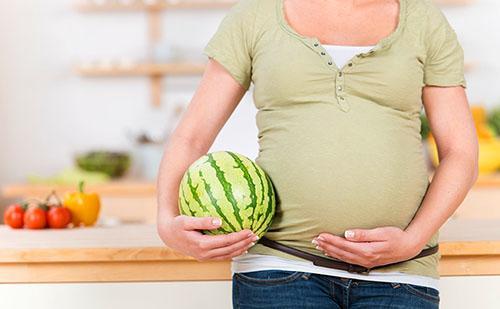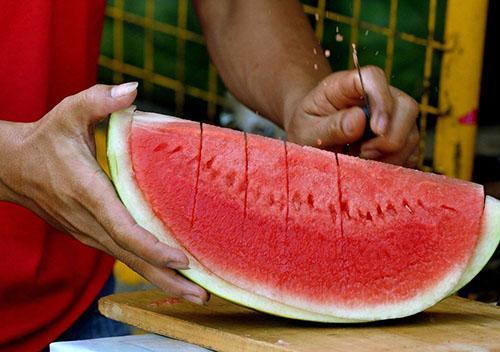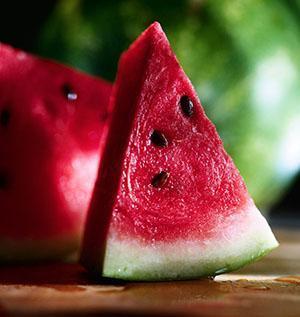A careful approach to drinking watermelon during pregnancy
 Pregnancy is the most responsible and difficult time in a woman's life, when she is responsible not only for her own health, but also for the development of the child. Therefore, expectant mothers try to saturate the body with vitamins and other useful substances.
Pregnancy is the most responsible and difficult time in a woman's life, when she is responsible not only for her own health, but also for the development of the child. Therefore, expectant mothers try to saturate the body with vitamins and other useful substances.
If the waiting time for the baby falls on the summer and early autumn, then it is simply impossible for a woman to walk past the huge collapses where watermelons are sold. A sweet slice relieves thirst and delivers incredible pleasure, but is watermelon useful for pregnant women, and will it be a good support for a woman during a period that cannot be called simple?
Under the influence of physiological processes, the expectant mother can experience not only positive emotions associated with the expectation of the baby. Pregnancy is sometimes accompanied by unpleasant symptoms and sensations, which include vitamin deficiency, toxicosis of different periods of pregnancy, anemic conditions, edema, digestive disorders, heartburn and nervous disorders. Can pregnant women eat watermelon? Will negative manifestations worsen?
Consisting of more than 90% of water, a huge berry, with a competent approach, can have an extremely beneficial effect on the female body, and in some cases even relieve the unpleasant sensations that accompany pregnancy.
Why is watermelon useful for pregnant women?

Therefore, doctors not only do not prohibit, but also strongly recommend including watermelons and other melons and gourds in the diet of a pregnant woman. Why can you eat watermelon during pregnancy? And what is its effect on the female body? In reasonable quantities and with proper quality, watermelon pulp will help:
- remove excess fluid from the body, which will prevent the formation of edema;
- gently cleanse the intestines and the whole body from toxins and toxins;
- normalize metabolism;
- cope with anemia;
- improve the functioning of the digestive system, playing the role of preventing constipation and establishing regular bowel movements;
- cope with stressful conditions and calm down.
And, among other things, watermelon during pregnancy is a good way to quench your thirst, quickly replenish the supply of strength and elements necessary for the body.
Surprisingly, just a small slice of watermelon from a pregnant woman can neutralize the signs of toxicosis.
 After this breakfast:
After this breakfast:
- mood improves;
- muscle weakness disappears;
- heartburn, nausea passes;
- retreating gagging.
In the third trimester, drinking a ripe watermelon containing magnesium and potassium for a pregnant woman can help relieve cramps and other muscle spasms.
Lycopene or how is watermelon useful during pregnancy
 One of the signs of ripeness and quality of a watermelon is traditionally the bright red or pink color of its flesh.And although today there are varieties with no less sweet and juicy yellow or even painful core, it is better for pregnant women to stay on more familiar fruits.
One of the signs of ripeness and quality of a watermelon is traditionally the bright red or pink color of its flesh.And although today there are varieties with no less sweet and juicy yellow or even painful core, it is better for pregnant women to stay on more familiar fruits.
It is in the red pulp that lycopene is found. This substance has all the properties of an antioxidant, supports immunity and protects the expectant mother from cardiovascular and neoplastic diseases.
The female body, as the fetus develops, experiences serious stress, and thanks to lycopene, several slices of watermelon:
- help to preserve and enhance beauty;
- take care of strengthening natural defenses;
- will protect you from unpleasant consequences if the expectant mother suddenly becomes absent-minded, forgetful, or starts to get upset about little things.
Benefits of watermelon during pregnancy for digestion
 But to answer in the affirmative to the question: "Can pregnant women eat watermelon?" follows not only for this reason. The role of watermelon in the diet is no less important if the expectant mother suffers from intestinal dysfunctions and other digestive disorders.
But to answer in the affirmative to the question: "Can pregnant women eat watermelon?" follows not only for this reason. The role of watermelon in the diet is no less important if the expectant mother suffers from intestinal dysfunctions and other digestive disorders.
The most common problem in the second half of pregnancy is constipation that torments women, arising from the increasing pressure of the uterus on the organs of the digestive tract as the baby develops. During pregnancy, watermelon, which is high in moisture and fiber, can be a mild and effective stool normalizer.
Red pulp activates metabolic processes, like a sponge cleaning out toxins, stimulating the activity of the intestines and stomach, preventing fecal masses from stagnating and serving as a source of toxins.
Juicy watermelon during pregnancy as a natural diuretic
 The kidneys of a pregnant woman, in addition to their usual functions, take on the responsibility to cleanse the mother's body of traces of the future baby's life. Therefore, the load on the genitourinary organs is seriously increasing. So, is it possible to eat watermelon during pregnancy, and will its use cause serious harm?
The kidneys of a pregnant woman, in addition to their usual functions, take on the responsibility to cleanse the mother's body of traces of the future baby's life. Therefore, the load on the genitourinary organs is seriously increasing. So, is it possible to eat watermelon during pregnancy, and will its use cause serious harm?
If you do not get carried away with watermelon and other juicy fruits, then they will only benefit. If the expectant mother does not have kidney and bladder diseases, then the doctor is unlikely to react negatively to the watermelon on the menu. On the contrary, if you eat up to 700 grams of fresh ripe pulp per day, it will serve diuretic and will help the elimination of both excess fluid and toxins.
In order to avoid troubles about the permissible portion of watermelon, it is better to ask the attending specialist, and with the slightest deterioration in health, it is better to refuse the delicacy.
Requirements for the quality of watermelon during pregnancy
 However, the beneficial qualities of a watermelon can only appear if the fruit is ripe and of high quality, as well as in the absence of medical contraindications. The earlier the watermelon hit the counter, the more likely it is not the hot summer sun for the sweetness and color of the pulp, but the chemicals that odd businessmen pump melons with in pursuit of profit.
However, the beneficial qualities of a watermelon can only appear if the fruit is ripe and of high quality, as well as in the absence of medical contraindications. The earlier the watermelon hit the counter, the more likely it is not the hot summer sun for the sweetness and color of the pulp, but the chemicals that odd businessmen pump melons with in pursuit of profit.
And if for an adult organism the permissible rate of nitrate consumption reaches 60 mg per day, then for an unborn child these substances are destructive in smaller quantities. That is why watermelon should not be consumed by pregnant women until the beginning of their mass ripening, that is, until mid or late August.
You can recognize the low quality of a watermelon:
- by uneven color of the pulp;
- on dry or undeveloped areas in the heart of the fruit;
- along coarse yellowish fibers piercing the pulp;
- by an unusual aroma or shade;
- on slimy or watery pulp near the seeds.
The abundance of sugar and a loose surface make the watermelon pulp attractive to all kinds of pathogenic microorganisms that are dangerous for women and the fetus.
In order for a watermelon to bring only benefits during pregnancy, it is necessary to thoroughly wash the bark before use, and the already cut fruit should not be stored even in the refrigerator for more than a day. And eating a summer treat is possible only with the permission of a doctor and subject to the strictest measures.
When and why should pregnant women not eat watermelon?
 A pregnant woman will have to give up drinking watermelon if she is diagnosed with diseases of the gastrointestinal tract or kidneys, as well as if she has an individual intolerance to the product.
A pregnant woman will have to give up drinking watermelon if she is diagnosed with diseases of the gastrointestinal tract or kidneys, as well as if she has an individual intolerance to the product.
Watermelon during pregnancy is able to provoke an exacerbation of inflammatory processes in the kidneys, ureters and the digestive system.
Since the juicy pulp can activate gas formation in the intestines, increase peristalsis and cause diarrhea, this threatens the expectant mother with painful sensations and other unpleasant symptoms. And if there are stones and sand in the urogenital area, the watermelon activates their movement, which will certainly affect the woman's well-being. This is why watermelon should not be allowed for pregnant women who have not received a doctor's approval. Only by observing the rules of caution and knowing the measure, you can enjoy the sugar aromatic pulp with pleasure and benefit.